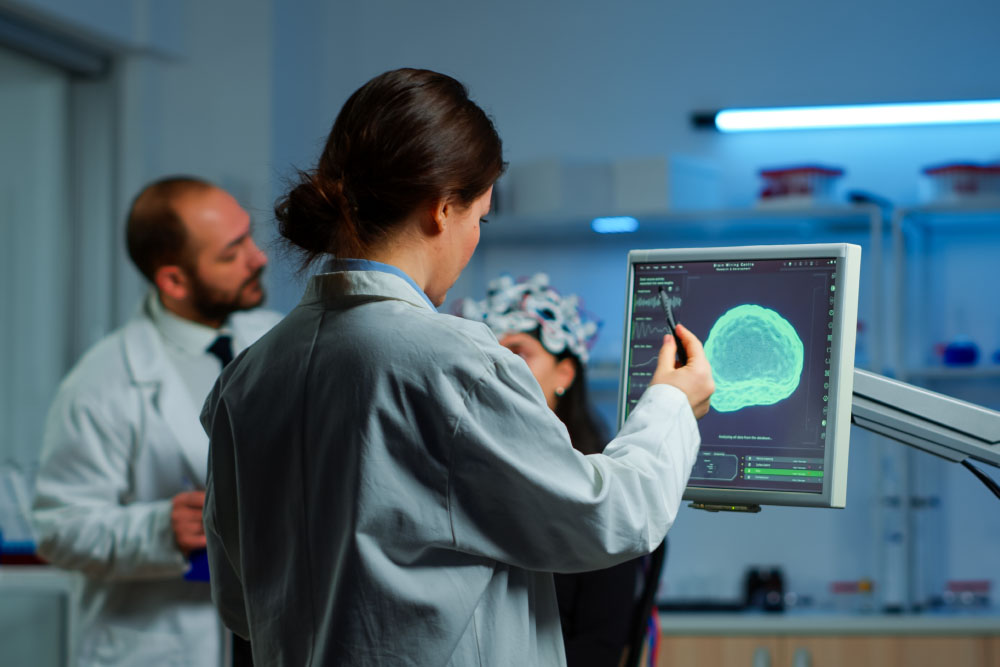-
Brain Stroke Surgery in UAE: When It’s Needed & What to Expect
-


If your loved one has just suffered a stroke, or if you’re trying to understand what happens during brain stroke surgery, you’re not alone. Every year, thousands of families across the UAE are faced with the shock and urgency of making fast, life-changing decisions after a stroke. It’s overwhelming and filled with questions, fear, and doubt.
Hi, I’m Dr. Tinku Jose Kurisinkal, Neurosurgeon at RAK Hospital. I’ve treated hundreds of stroke patients some who arrived within minutes of their first symptom, and others who came in hours later, still unsure what had happened. The truth is, a stroke doesn’t always give a warning. It cuts off blood flow to the brain, and in many cases, it leads to permanent damage unless we act quickly.
In some strokes, medication alone can help. But in severe cases, brain stroke surgery is required whether it’s to remove a clot, stop internal bleeding, or relieve the dangerous pressure building inside the skull. These are critical decisions that families often have to make in the middle of an emergency with limited information.
The purpose of this article is to give you a clear, step-by-step understanding of what brain stroke surgery involves how it works, who needs it, what to expect after surgery, and how we support recovery here at RAK Hospital.
Let’s start by understanding what a brain stroke really is and why every second matters.
A brain stroke happens when the brain suddenly stops getting enough blood flow. That means oxygen and nutrients can’t reach brain cells, and they start dying fast. In fact, doctors often say: “Time is brain.” Every minute matters.
There are two main types of stroke:
In both cases, the result is the same, the brain is starved of blood, and brain tissue starts to get damaged.
Strokes don’t always look dramatic. But these early signs should never be ignored:
Many of the patients we see at RAK Hospital come in too late because the symptoms were brushed off. But when it comes to a stroke, delaying treatment can cause permanent brain damage affecting memory, speech, movement, and even personality.
High blood pressure is one of the biggest risk factors. It puts stress on the delicate arteries in the brain, making them more likely to burst or clog. That’s why managing blood pressure is key -especially if there’s a family history of stroke or carotid artery disease.
We understand this is the first question every family wants answered.
The truth is survival depends on how quickly we start treatment. If the patient reaches the hospital within the first few hours, and we begin the right care whether it’s medication or surgery the chances of survival can be very good.
But stroke is serious. It affects the brain, and the brain controls everything speech, memory, movement, even breathing. So, time is very important.
At RAK Hospital, we have a 24/7 stroke emergency team trained to act fast. If your loved one is here early, we will do everything possible to stabilize, treat, and help them recover safely.
Not every stroke needs surgery.
In many cases, especially mild strokes, we treat with injections or medications that help dissolve clots and restore blood flow.
But if the stroke is severe, caused by a large clot, bleeding inside the brain, or swelling, then surgery becomes necessary to save the patient’s life or prevent permanent damage.
We make this decision after doing urgent brain scans (CT or MRI). Our goal is always to try the least invasive option first but if surgery is the safest or only option, we act quickly to give the patient the best chance of recovery.
This depends on which part of the brain was affected by the stroke and how quickly treatment started.
Recovery is often slow but possible, with the help of physiotherapy, speech therapy, and regular rehabilitation. The brain takes time to heal, and our rehab team at RAK Hospital will guide you step-by-step during that journey.
Recovery after a brain stroke surgery can vary from person to person. Some people start improving within a few weeks, while others may take several months.
Here’s what to expect:
Over time, many regain independence, but some may need long-term support depending on the severity of the stroke and how much of the brain was affected.
The good news? At RAK Hospital, we have a full rehab team that works closely with families to create a personalized recovery plan.
Yes, brain surgery does carry risks like any major surgery, especially involving the brain.
But here’s the key point:
When surgery is recommended for a stroke, it usually means the risk of not doing it is even higher.
Our neurosurgeons only suggest surgery if they believe it can save the patient’s life, stop further brain damage, or improve the outcome.
At RAK Hospital, we use:
The survival rate depends on how early treatment begins, the patient’s age, health condition, and the type of stroke. But the earlier we act, the better the chances.
Yes, there is a possibility. Having one stroke means the person is at higher risk of a second stroke but the good news is, we can reduce that risk with the right care.
After surgery, we focus on:
We also monitor the brain and carotid arteries regularly. If the patient and family follow the recovery plan, the chances of another stroke can be greatly reduced.
In most stroke cases, there is no time to wait.
When the brain doesn’t get enough blood or starts bleeding, every minute means more brain cells are dying. If surgery is needed, there’s usually a small window of time sometimes just a few hours to act and save the brain.
Delaying surgery or waiting to decide can cause permanent damage, disability, or even death. That’s why we recommend quick action after reviewing all test results and explaining the risks to the family clearly.
We know it’s overwhelming, but our job at RAK Hospital is to guide you with honest advice and fast support.
At RAK Hospital, we understand that every stroke is different and so is the treatment. When medication alone isn’t enough, our expert neurosurgeons and interventional radiologists perform highly specialized stroke surgeries to restore blood flow to the brain and prevent further damage.
Here are the main types of brain stroke surgeries we offer:
When a stroke is caused by bleeding in the brain (hemorrhagic stroke), a craniotomy may be needed. This involves surgically opening a small part of the skull to:
This surgery is often life-saving, particularly when the bleeding is extensive or causing significant swelling.
For patients with dangerously high intracranial pressure, a decompressive craniectomy is performed. In this procedure, a larger section of the skull is temporarily removed to allow the swollen brain to expand safely—preventing further injury and improving survival outcomes.
In cases involving hydrocephalus, especially following posterior circulation strokes; an External Ventricular Drain is placed to:
Recovering from a stroke is only half the journey and the other half is making sure it doesn’t happen again.
At RAK Hospital, stroke prevention is a long-term partnership between our care team and you. Once a patient has had a stroke, they’re at a higher risk of having another. But the good news is: with the right lifestyle and medical care, you can reduce that risk significantly.
Here’s how:
High blood pressure is the #1 cause of both ischemic and hemorrhagic strokes.
Regular checkups, medications, and lifestyle changes are essential. Our specialists help you find the right balance to keep your blood pressure stable.
Some simple everyday habits can make a huge difference:
These steps improve circulation and brain health, and directly reduce stroke risk.
Depending on the type of stroke, your doctor may prescribe:
Always take them as directed they are critical in preventing another stroke.
Our stroke team will track your progress through:
By watching these key areas, we can catch potential issues before they become dangerous.
When it comes to brain stroke, every second counts and so does who you trust for treatment. At RAK Hospital, we’ve built a reputation for life-saving stroke care that combines world-class expertise with heartfelt support for patients and families.
Here’s why so many people across the UAE choose us:
✔️ Expert Neurosurgeons and Interventional Specialists
Our stroke unit is led by highly trained neurosurgeons, neurologists, and interventional radiologists who specialize in complex stroke surgeries. From clot removal to advanced brain and vascular procedures, you’re in the safest hands.
✔️ Fast-Response Stroke Team – Available 24/7
Stroke is an emergency and our rapid-response team is always ready. Whether it’s midnight or mid-afternoon, we act fast to diagnose, stabilize, and begin treatment immediately. Our stroke protocols are designed to save brain tissue and save lives.
✔️ Advanced Imaging and Surgical Technology
RAK Hospital is equipped with the latest brain imaging, digital angiography systems, and surgical monitoring tools. These help us diagnose the exact type of stroke and perform precise, minimally invasive surgeries whenever possible.
✔️ Comprehensive Rehabilitation Services
Surgery is just one part of recovery. We offer full in-house stroke rehabilitation, including:
Our rehab team works closely with patients and families to maximize recovery, restore independence, and improve quality of life.
✔️ Compassionate, Multilingual Care
We understand the cultural and emotional needs of our diverse patient population in the UAE. Our doctors, nurses, and rehab staff communicate with clarity, compassion, and care because your healing journey matters to us.
A brain stroke doesn’t give you time but your response time can save a life.
If you or someone around you experiences warning signs like sudden weakness, slurred speech, facial droop, or confusion, don’t wait. Act fast. Call for emergency help immediately. Every minute of delay can cause irreversible damage to brain tissue.
Surgical treatment – whether to remove a clot, relieve pressure, or open blocked arteries is often the difference between recovery and permanent disability. But it works best when done on time.
At RAK Hospital, we have the expertise, technology, and care systems in place to treat stroke quickly and effectively. Our team of specialists is ready 24/7 to assess your risk, manage your symptoms, and guide you on the safest path forward.







